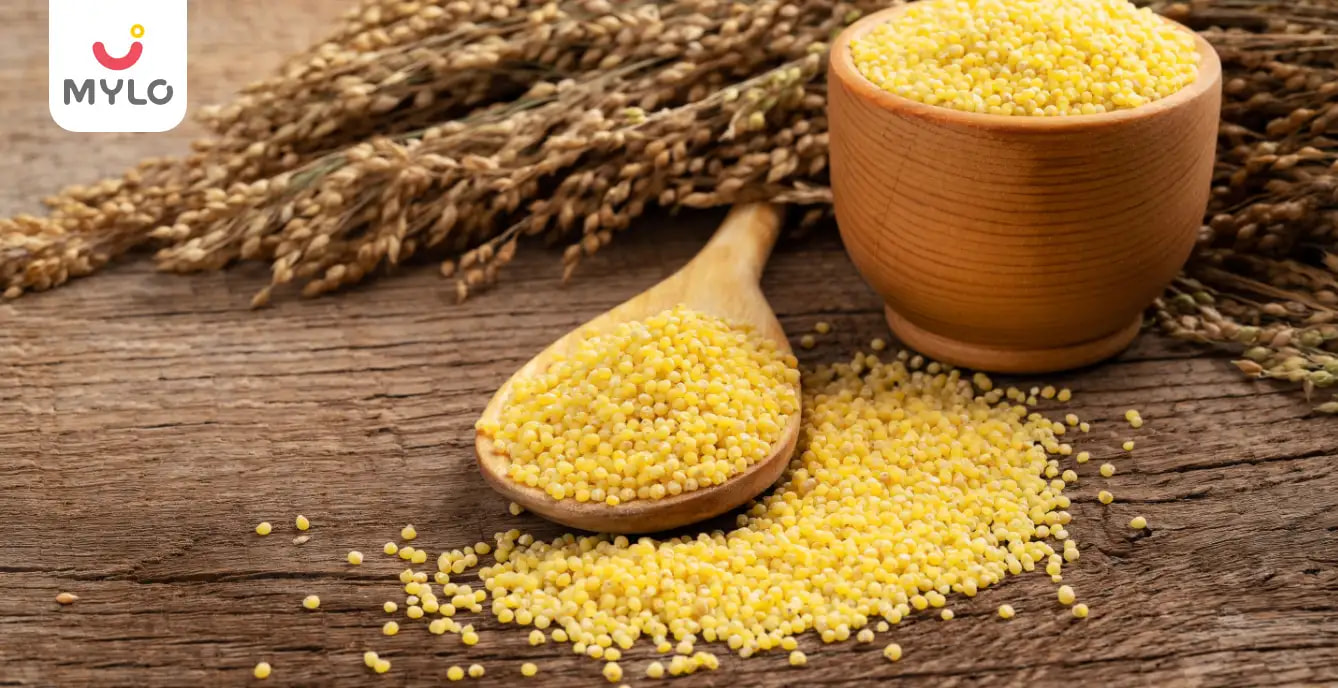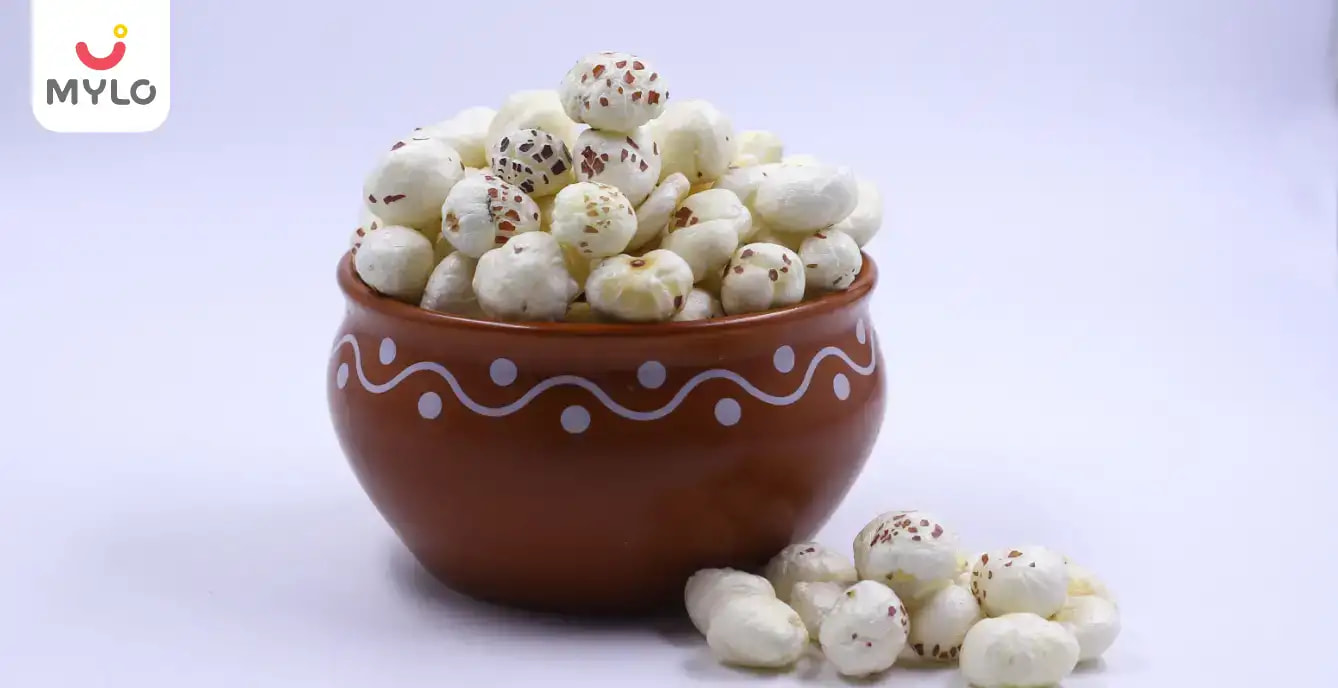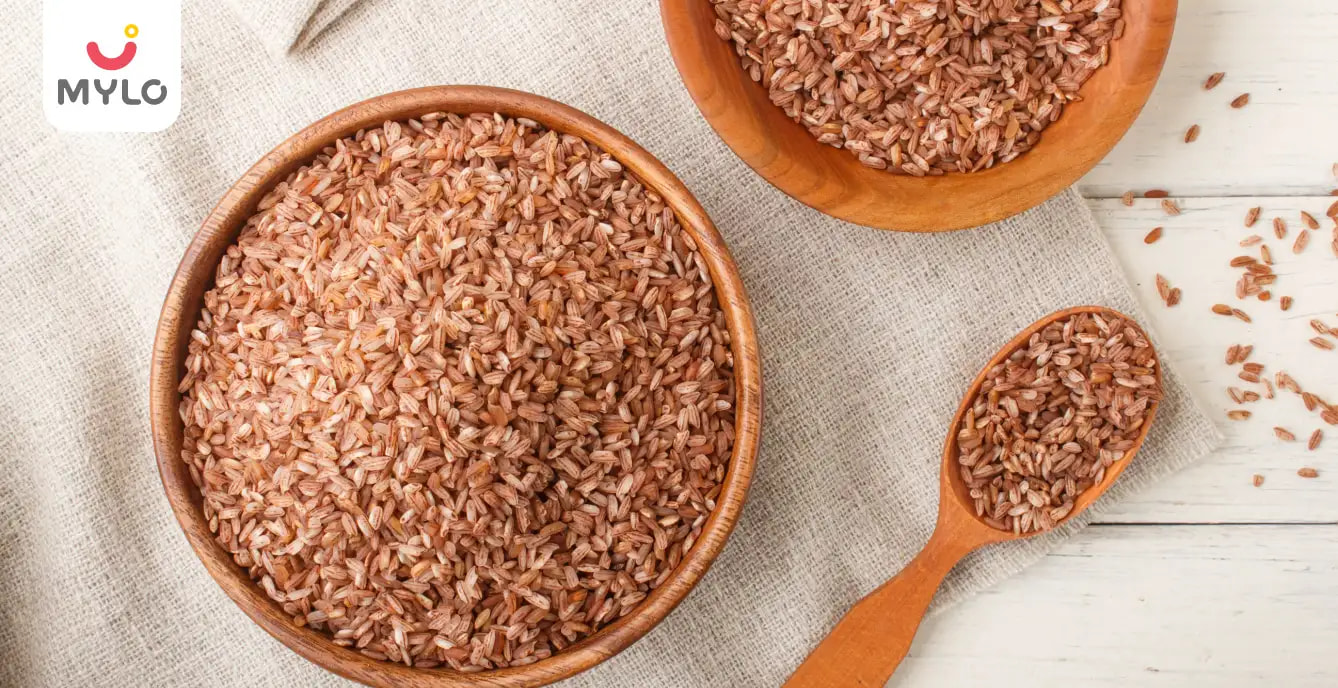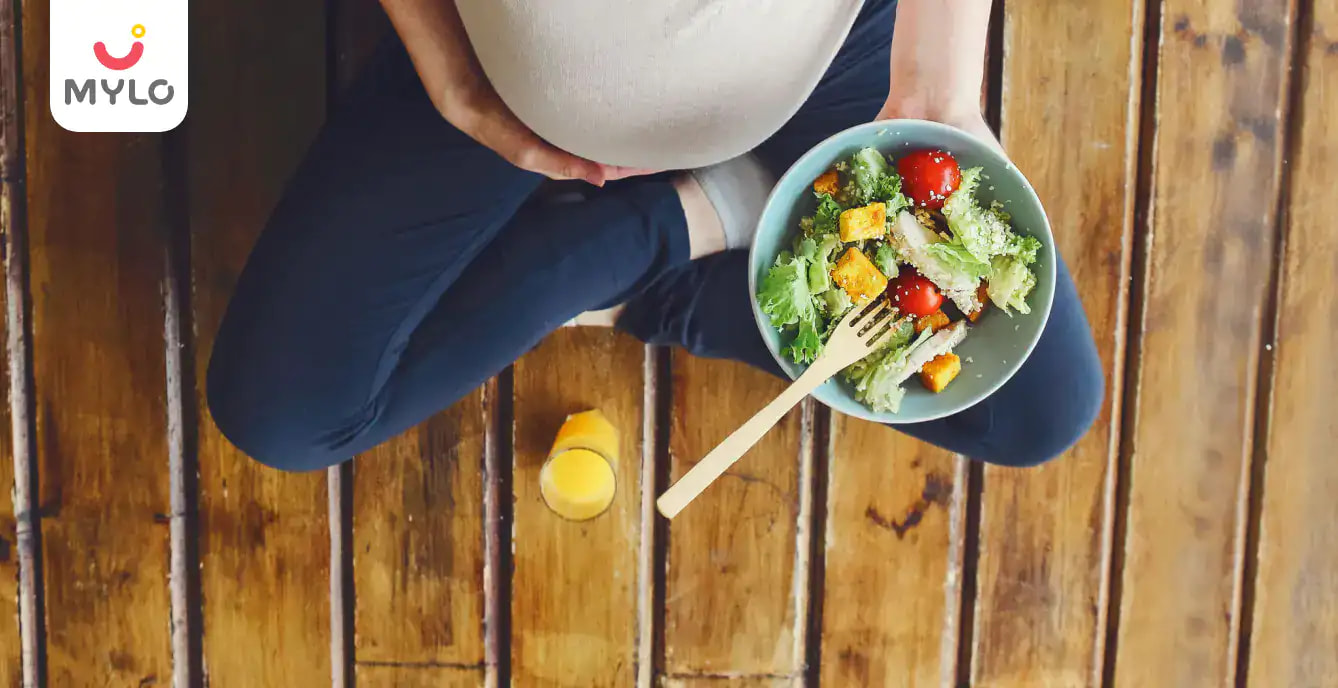Home

Diet & Nutrition

Ragi During Pregnancy: The Ultimate Guide to Benefits, Recipes and Precautions
In this Article
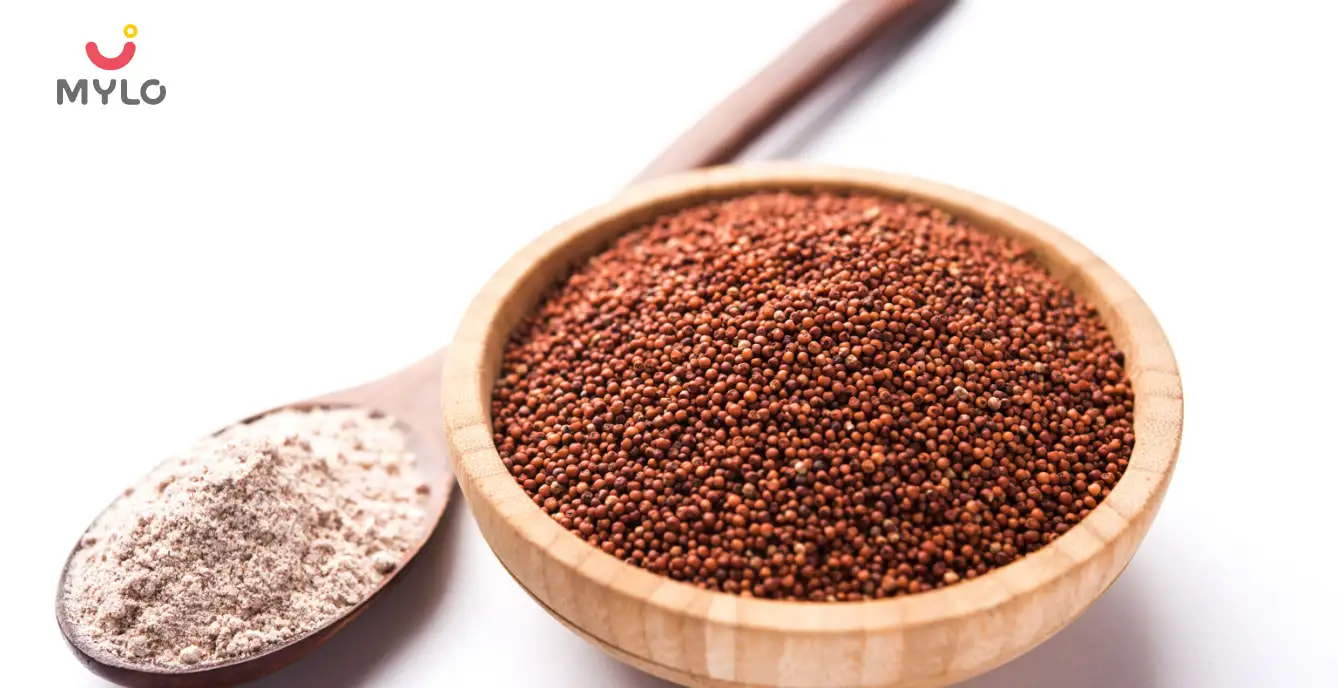
Diet & Nutrition
Ragi During Pregnancy: The Ultimate Guide to Benefits, Recipes and Precautions
Updated on 3 November 2023


Medically Reviewed by
Savita
Diabetes, Weight Loss, Thyroid, PCOS - Masters in Food & Nutrition
View Profile

If you're pregnant or planning to be, you've probably heard a lot about the importance of eating a healthy, balanced diet. But did you know that certain foods can offer extra benefits for both you and your growing baby? One such food is ragi, also known as finger millet. This humble grain has been a staple in many cultures for centuries, and for good reason. Not only is it packed with essential nutrients, but you can also get multiple benefits by eating ragi during pregnancy.
In this article, we'll take a closer look at the nutrition value and benefits of ragi during pregnancy, and why you might want to consider adding it to your diet.
What is Ragi?
Ragi is a popular millet in India and is used for making different types of dishes. This millet resembles mustard seeds and is called finger millet in English. Ragi flour is used to make dosas, idlis, Ragi adai, and porridge. It is an unpolished millet, as it is too tiny to be processed. The high iron and carbohydrate content of ragi makes it an ideal breakfast food for everyone.
You may also like: Benefits of Millets During Pregnancy
Is Ragi Good for Pregnancy?
Yes, it is safe to consume ragi in pregnancy. In fact, ragi is highly recommended for pregnant women due to its numerous health benefits. It is a nutritional superfood for pregnant women and is rich in protein, vitamins, minerals, calcium, iron, natural fats, and other essential nutrients.
Benefits of consuming ragi include cell and tissue repair, boosts energy, and helps in dealing with insomnia. Consuming ragi during one's pregnancy can also helps in milk production, controlling cholesterol levels, and reducing the risk of gestational diabetes.
Despite the many health benefits of ragi, some pregnant women avoid eating it. This is because they believe that eating ragi while they're pregnant may make their baby dark. This is an absurd myth, as there is no scientific proof that ragi affects the baby's complexion. A baby's complexion is purely dependent on the genetic traits they inherit.
Nutritional Value of Ragi
Ragi is considered a powerhouse ingredient as it is packed with essential nutrients.
-
It has a variety of micro- and macronutrients along with essential vitamins, proteins, iron, and fats.
-
It is an excellent plant-based source of amino acids such as isoleucine and valine.
-
It also has high contents of vitamin C, vitamin E, folic acid, and calcium.
-
It has a high carbohydrate content of around 336 kcal per 100 g.
Benefits of Ragi During Pregnancy
Ragi's benefits during pregnancy cannot be undermined, as this is an excellent superfood for mom and baby. The high nutritional value of ragi helps provide the necessary energy for the mother and aids in proper fetal development.
The health benefits of ragi in pregnancy include the following:
1. Source of essential nutrients
Ragi is jam-packed with essential vitamins, minerals, fiber, and natural fats. These nutrients are vital for maintaining the health of pregnant women and ensuring proper fetus development.
2. Manages insomnia
Sleeplessness and insomina during pregnancy are common. The amino acids in ragi help pregnant women fight insomnia triggered by pregnancy hormones.
3. Enhances breastmilk production
As ragi is high in amino acids, calcium, and iron, it helps boost breast milk supply. These nutrients make ragi an essential food for pregnant and postpartum moms keen on breastfeeding their babies.
4. Prevents gestational diabetes
Doctors recommend ragi to expectant mothers at a high risk of developing gestational diabetes. This is because ragi has a high content of polyphenols, which helps reduce blood sugar levels naturally.
5. Relieves stress
Pregnant women under much stress or are prone to depression should include ragi in their diet. The amino acids in ragi help to reduce stress levels and depression during pregnancy. Relieving stress is a significant but often overlooked health benefit that ragi provides.
6. Controls cholesterol levels
High cholesterol levels during pregnancy pose a significant risk to both the mother and the unborn child. High cholesterol levels can lead to hypertension and other medical complications. Ragi has good levels of lecithin and methionine, which help keep the mother's cholesterol levels in check.
7. Prevents anemia
Preventing iron deficiency and anemia in pregnancy is critical as it can hamper fetal development. Ragi contains high iron and vitamin C levels that help prevent anemia during pregnancy.
How Much Ragi is Safe to Eat During Pregnancy?
It is recommended to consume ragi in moderation during pregnancy. It can be eaten in various forms, such as rotis, porridge, adai, dosa, ragi chips, millet noodles, instant upma mix, and ragi balls. It is a nutrient-dense food, and it is generally recommended to eat to 3-4 teaspoonful of ragi flour in a day during pregnancy.
However, pregnant women need to be extra cautious with their diet as it can affect their health adversely. Following the doctor's recommended diet plan is important during pregnancy.
Are There Any Side Effects of Ragi During Pregnancy?
Ragi is safe and highly recommended by doctors and elders alike due to its numerous health benefits. However, if you are allergic to ragi, you should avoid consuming it and other food that can cause irritation. Excessive consumption of ragi can lead to bloating, diarrhea, and other digestive issues during pregnancy.
Ragi should also be avoided by pregnant women who have pre-existing medical conditions such as kidney disease or thyroid imbalance. Ragi's high protein content and goitrogenic compounds can further escalate these medical conditions. Pregnant women should consult their doctor before eating ragi to avoid health issues.
Healthy Recipes for Eating Ragi in Pregnancy
Here are two recipes that are healthy and nutritious options to include ragi in your diet during pregnancy:
1. Ragi Porridge
- In a saucepan, mix 2 tablespoons of ragi flour with a small amount of water to make a smooth paste.
- Add 1 cup of water or milk (dairy or plant-based) to the saucepan and stir well.
- Place the saucepan on medium heat and cook the mixture, stirring continuously, until it thickens and reaches a porridge-like consistency.
- Optional: Add a natural sweetener like jaggery or dates for added taste.
- Serve the ragi porridge warm and enjoy as a nourishing and wholesome snack or breakfast option during pregnancy.
2. Ragi Dosa
- Soak urad dal in water for 4-5 hours. Grind it to a smooth batter.
- In a separate bowl, mix ragi flour, rice flour, and salt.
- Add the urad dal batter to the ragi mixture and mix well. Add water to achieve a dosa batter consistency.
- Heat a tawa or non-stick pan and grease it with oil.
- Pour a ladleful of the batter onto the tawa and spread it in a circular motion to form a thin dosa.
- Drizzle oil around the edges and cook until the dosa turns golden brown.
- Flip the dosa and cook the other side for a minute.
- Serve hot with chutney or sambar.
You may also like: Brown Rice During Pregnancy: Benefits & Precautions
Conclusion
In conclusion, ragi is a highly nutritious and beneficial grain that can provide numerous health benefits for pregnant women. It is rich in essential nutrients like calcium, iron, fiber, and protein, which are vital for the healthy development of both the mother and the fetus. The consumption of ragi during pregnancy can help prevent anemia, improve digestion, boost immunity, and regulate blood sugar levels. However, it is important to consult a doctor and ensure that ragi is consumed in moderation and as a part of a balanced diet.
References
1. Kumar A, Metwal M, Kaur S, Gupta AK; et al. (2016). Nutraceutical Value of Finger Millet [Eleusine coracana (L.) Gaertn.], and Their Improvement Using Omics Approaches. Front Plant Sci.
2. Shobana S, Krishnaswamy K, Sudha V; et al. (2013). Finger millet (Ragi, Eleusine coracana L.): a review of its nutritional properties, processing, and plausible health benefits. Adv Food Nutr Res.
Tags
Ragi During Pregnancy in Hindi, Ragi During Pregnancy in Bengali, Ragi During Pregnancy in Tamil, Ragi During Pregnancy in Telugu




Medically Reviewed by
Savita
Diabetes, Weight Loss, Thyroid, PCOS - Masters in Food & Nutrition
View Profile


Written by
Parul Sachdeva
A globetrotter and a blogger by passion, Parul loves writing content. She has done M.Phil. in Journalism and Mass Communication and worked for more than 25 clients across Globe with a 100% job success rate. She has been associated with websites pertaining to parenting, travel, food, health & fitness and has also created SEO rich content for a variety of topics.
Read MoreGet baby's diet chart, and growth tips

Related Articles
Related Questions
Hello frnds..still no pain...doctor said head fix nhi hua hai..bt vagina me pain hai aur back pain bhi... anyone having same issues??

Kon kon c chije aisi hai jo pregnancy mei gas acidity jalan karti hain... Koi btayega plz bcz mujhe aksar khane ke baad hi samagh aata hai ki is chij se gas acidity jalan ho gyi hai. Please share your knowledge

I am 13 week pregnancy. Anyone having Storione-xt tablet. It better to have morning or night ???

Hlo to be moms....i hv a query...in my 9.5 wk i feel body joint pain like in ankle, knee, wrist, shoulder, toes....pain intensity is high...i cnt sleep....what should i do pls help....cn i cosult my doc.

Influenza and boostrix injection kisiko laga hai kya 8 month pregnancy me and q lagta hai ye plz reply me

RECENTLY PUBLISHED ARTICLES
our most recent articles

Diet & Nutrition
গর্ভাবস্থায় আলুবোখরা: উপকারিতা ও ঝুঁকি | Prunes During Pregnancy: Benefits & Risks in Bengali

Diet & Nutrition
গর্ভাবস্থায় হিং | ঝুঁকি, সুবিধা এবং অন্যান্য চিকিৎসা | Hing During Pregnancy | Risks, Benefits & Other Treatments in Bengali

Women Specific Issues
স্তনের উপর সাদা দাগ: লক্ষণ, কারণ এবং চিকিৎসা | White Spots on Nipple: Causes, Symptoms, and Treatments in Bengali

Diet & Nutrition
গর্ভাবস্থায় পোহা: উপকারিতা, ধরণ এবং রেসিপি | Poha During Pregnancy: Benefits, Types & Recipes in Bengali

Diet & Nutrition
গর্ভাবস্থায় মাছ: উপকারিতা এবং ঝুঁকি | Fish In Pregnancy: Benefits and Risks in Bengali

Diet & Nutrition
গর্ভাবস্থায় রেড ওয়াইন: পার্শ্ব প্রতিক্রিয়া এবং নির্দেশিকা | Red Wine During Pregnancy: Side Effects & Guidelines in Bengali
- ইনার থাই চ্যাফিং: কারণ, উপসর্গ এবং চিকিৎসা | Inner Thigh Chafing: Causes, Symptoms & Treatment in Bengali
- গর্ভাবস্থায় ব্রাউন রাইস: উপকারিতা ও সতর্কতা | Brown Rice During Pregnancy: Benefits & Precautions in Bengali
- Velamentous Cord Insertion - Precautions, Results & Safety
- Unlock the Secret to Flawless Skin: 7 Must-Have Qualities in a Face Serum
- Unlock the Secret to Radiant Skin: How Vitamin C Serum Can Transform Your Complexion
- Gender No Bar: 10 Reasons Why Everyone Needs a Body Lotion
- Unlock the Secret to Radiant Skin How to Choose the Perfect Body Lotion for Your Skin Type
- Top 10 Reasons to Apply a Body Lotion After Every Bath
- Communication in Toddlers: Milestones & Activities
- How to Improve Vocabulary for Toddlers?
- A Comprehensive Guide to Understanding Placenta Accreta
- Vulvovaginitis in Toddlers Causes, Symptoms and Treatment
- A Comprehensive Guide to Understanding Cerebral Palsy in Children
- Bitter Taste in Mouth During Pregnancy: Understanding the Causes and Remedies


AWARDS AND RECOGNITION

Mylo wins Forbes D2C Disruptor award

Mylo wins The Economic Times Promising Brands 2022
AS SEEN IN

- Mylo Care: Effective and science-backed personal care and wellness solutions for a joyful you.
- Mylo Baby: Science-backed, gentle and effective personal care & hygiene range for your little one.
- Mylo Community: Trusted and empathetic community of 10mn+ parents and experts.
Product Categories
Baby Carrier | Baby Soap | Baby Wipes | Stretch Marks Cream | Baby Cream | Baby Shampoo | Baby Massage Oil | Baby Hair Oil | Stretch Marks Oil | Baby Body Wash | Baby Powder | Baby Lotion | Diaper Rash Cream | Newborn Diapers | Teether | Baby Kajal | Baby Diapers Pants | Cloth Diapers | Laundry Detergent | Lactation Granules |



